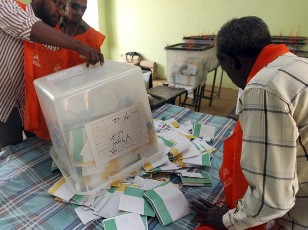Domestic observer group taunts NEC, calls for early referendum arrangements
By Julius N. Uma
August 2, 2010 (JUBA) — Sudan’s general elections fell below internationally agreed standards largely due to lack of transparency and proper coordination within the National Elections Commission (NEC), Sudan Domestic Election Monitoring and Observation Programme (SuDEMOP) said in its latest report.

In its final April 2010 general elections report, the domestic observer group largely blames the Khartoum-based electoral body for failure to properly contain its evident logistical and administrative shortcomings.
Cited specifically were issues like insufficient distribution of polling materials to polling stations, printing and distribution of incorrect voter registers, giving incorrect information on constituency boundaries in some areas, deliberate omission or exchange of candidates’ on ballot papers, among others.
“The elections were characterized by delays in communicating information about the electoral calendar, putting forth the electoral procedures, announcement of dates for accreditation of observers/observer groups, contracting polling and announcing of results,” the 28-paged report reads in part.
However, apart from the named upheavals that reportedly characterized NEC, SuDEMOP also cited the widely disputed Southern Sudan census results, weather factors and problems associated with printing and delivery of materials as notable shortcomings that marred the elections.
Overall however, SuDEMOP recruited, trained and deployed 782 volunteers across all the 10 states of Southern Sudan. These volunteers, drawn from among its member organizations, were tasked with observing the entire election processes.
The elections, the first multi-party polls in the war-ravaged country since 1986, were replete with technical problems, fraud charges and opposition boycotts.
EU observers and the Carter Centre both concluded that the elections failed to live up to international standards, and both said the chaos was worse in semi-autonomous south Sudan, which also elected its own president.
In the north, Bashir claimed victory with 68 percent of the vote, after two top rivals accused him of orchestrating a victory in advance and withdrew from the contest.
Meanwhile, the local observer group appealed to the recently-initiated Referendum Commission, the Referendum Bureau and other bodies formed for purposes of the referendum, to collaborate and coordinate with NGOs, civil society organizations, media and local artists to conduct early massive civic education campaigns across the country.
“The administrators of the referendum tasked with overseeing this process should ensure that a voter registration exercise is conducted and adequate exhibition period given. This will enable voters to verify their names on the register, while those with queries can have their issues resolved amicably,” Lorna Merekaje, SuDEMOP’s Secretary General told Sudan Tribune during the report launch.
Already earmarked for January early next year, Sudan’s referendum is a key requirement within the country’s Comprehensive Peace Agreement (CPA); the accord that ended over two decades of a bloody civil war fought between north and south of Africa’s largest country.
(ST)

Samson
Domestic observer group taunts NEC, calls for early referendum arrangements
I believe if GOSS take action earlier would be wise choice to make world proud of them. But for their weakness they are going to wait until the NCP delay any work the GOSS are doing. I wish the President of GOSS can take action now then later.